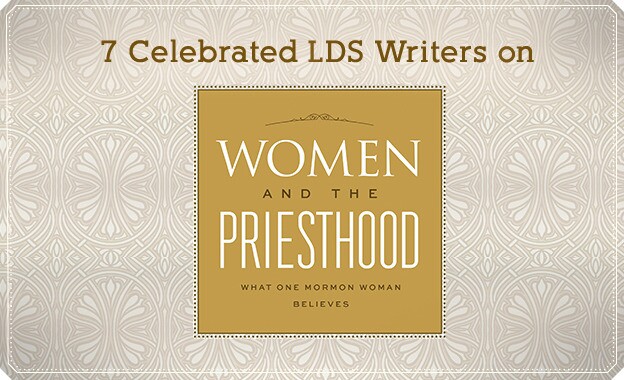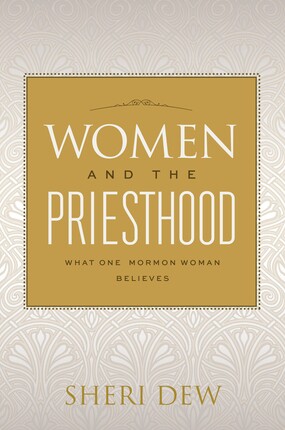
Every week, my email box is graced with letters from missionaries who are preaching the gospel of Jesus Christ throughout the world. The faith of these young servants of God stirs my soul. They speak with such power!
I felt similar stirrings as I began reading the last chapter of Sister Dew’s book, Women and the Priesthood. Perhaps it’s because she was capturing the “exquisite” influence of missionaries (p. 155). Maybe it was because I was excited to read the new lyrics to “As Sisters in Zion” (written specifically for sister missionaries, p. 156). Surely it’s because the title of her chapter reflects something I believe so strongly: “Converted Women Can Change the World.”
In fact, there are few things I feel more passionate about than the power and potential of women. As someone educated in organizational behavior (and after years of being involved in online discussions about women in the Church), I understand why some think that Mormon women cannot reach their full potential without priesthood ordination. Power is typically connected with organizational position or functional opportunity and responsibility. Interestingly, equality is measured in similar ways.
Throughout the pages of Women and the Priesthood, and especially in the final chapter of her book, I think Sister Dew gets at the heart of what makes power and equality in the Lord’s kingdom different. She reflects what prophets and the Lord Himself have urged us toward: conversion. In the context of this book, the message is clear: conversion is key to understanding, accessing, and channeling priesthood power of God on behalf of His children.
Following are some of my reflections on Sister Dew’s thoughts about this key truth.
- “Conversion requires immersion” (p. 158, p. 170). The urgency of the latter-day hastening of the work will require more than a casual commitment; indeed, it will require “something...that’s never been asked before” (see Elder Holland quote, p. 157). To me, this notion of immersion also brings to mind the symbolism of baptism, confirmation, and temple ordinances. I ponder not only my part in gospel covenants, but revel in the wonder of what it can mean to be immersed in, cleansed through, and covered by the Savior’s grace and mercy. Conversion is not only an invitation to be committed; it’s an invitation to be healed, sealed, nurtured, loved, forgiven, empowered, comforted, and changed--changed by the unchanging love of the Father and His Son (see p. 167).
- There is power in having an eternal perspective and exercising our agency in ways that build faith in that long-term view. How we spend our time matters! (See pp. 157-158)
- Conversion is more than having a testimony, as important as testimony is (p. 169-170). And it “is not about doing more. But it may be about doing things differently” (p. 170).
- We can exercise agency to invite the Spirit to flow in “sustained, penetrating ways” (p. 170). His influence can help us transcend doubt and temptation--things that hinder us from giving our all to doing and defending God’s work (p. 171).
- We can wholeheartedly trust prophetic teachings that both the unique and the combined roles of men and women are vital to “the unfolding of this spectacular ending drama” (p. 162). Sister Dew shares some favorite quotes of mine (see, for example, pp. 162, 171, 172-173) that invite women to believe in our “mission-critical” role (p. 163).
I have two more thoughts I would like to share in conclusion, reasons why I think the focus on conversion is so critical to discussions on women and priesthood. First of all, the invitation to conversion is an invitation to unlock the power of agency. Insisting that women can only reach their potential when or if something outside them changes is not only inconsistent with gospel doctrine, it is also inconsistent with important principles of mental and emotional health.
Secondly, a focus on conversion keeps the focus on Christ. When all is said and done, in my mind, priesthood is simply what allows His saving grace to flow to all of Heavenly Father’s children on both sides of the veil. Conversion is allowing Christ’s grace to change us, so we can then help others come to Him.
I echo Sister Dew. “The time has come for us to do things we have never done before” (p. 173). Conversion to Christ and His gospel is key, both to reaching our own potential and helping others do the same.
Michelle Linford has a B.S. in psychology and an MBA with an Organization Behavior emphasis from BYU. She is a stay-at-home mom of three, the managing editor of mormonwoman.org, and has been a keynote speaker and panelist in numerous Women in Business events as a member of the Marriott School’s Undergraduate Advisory Board.
In Women and the Priesthood, beloved author Sheri Dew explores the doctrines surrounding a topic that is crucial for both women and men to understand: the role of women in the LDS Church and their relationship with the priesthood.
Key discussions include the varying responsibilities of men and women in the context of key doctrine of the Church and the eternal truths that women are vital to the success of the Lord's church, that God expects women to receive revelation, and that both men and women have access to God's highest spiritual blessings.
This enlightening book shows how studying the doctrine of the priesthood will help you find the answers you seek about women and the priesthood, about women in the Church, and about the vital influence righteous women can have in the world. Get it now Deseret Book.

